ENTREPRENUERSHIP Report: Analysis of Ventures, Statistics, and Traits
VerifiedAdded on 2023/02/02
|15
|3822
|95
Report
AI Summary
This report provides a comprehensive overview of entrepreneurship, examining various types of entrepreneurial ventures including small enterprises, large businesses, social businesses, lifestyle businesses, gazelle ventures, and scalable start-ups. It explores the similarities and differences between these ventures, analyzing their characteristics, goals, and capital sources. The report also delves into the impact of micro and small businesses on the UK economy, providing statistical data on their contributions to employment and turnover. Furthermore, it discusses the importance of these businesses in creating jobs, fostering relationships, and distributing wealth. The report also addresses the traits and skills of successful entrepreneurs, highlighting how entrepreneurial personality reflects mind set and motivation and how these factors influence business success. Finally, the report considers the background and experience that can either obstruct or foster entrepreneurship, providing a well-rounded analysis of this critical field.

ENTREPRENUERSHIP
Paraphrase This Document
Need a fresh take? Get an instant paraphrase of this document with our AI Paraphraser

Table of Contents
INTRODUCTION...........................................................................................................................3
TASK1.............................................................................................................................................3
P1. ..........................................................................................................................................3
P2. Similarities and differences between entrepreneurial ventures. ......................................5
TASK2.............................................................................................................................................8
P3. ..........................................................................................................................................8
P4. ..........................................................................................................................................9
TASK3.............................................................................................................................................9
P5. ..........................................................................................................................................9
P6. How entrepreneurial personality reflects mind set and motivation................................12
TASK4...........................................................................................................................................13
P7. ........................................................................................................................................13
CONCLUSION..............................................................................................................................14
REFRENCE...................................................................................................................................14
INTRODUCTION...........................................................................................................................3
TASK1.............................................................................................................................................3
P1. ..........................................................................................................................................3
P2. Similarities and differences between entrepreneurial ventures. ......................................5
TASK2.............................................................................................................................................8
P3. ..........................................................................................................................................8
P4. ..........................................................................................................................................9
TASK3.............................................................................................................................................9
P5. ..........................................................................................................................................9
P6. How entrepreneurial personality reflects mind set and motivation................................12
TASK4...........................................................................................................................................13
P7. ........................................................................................................................................13
CONCLUSION..............................................................................................................................14
REFRENCE...................................................................................................................................14
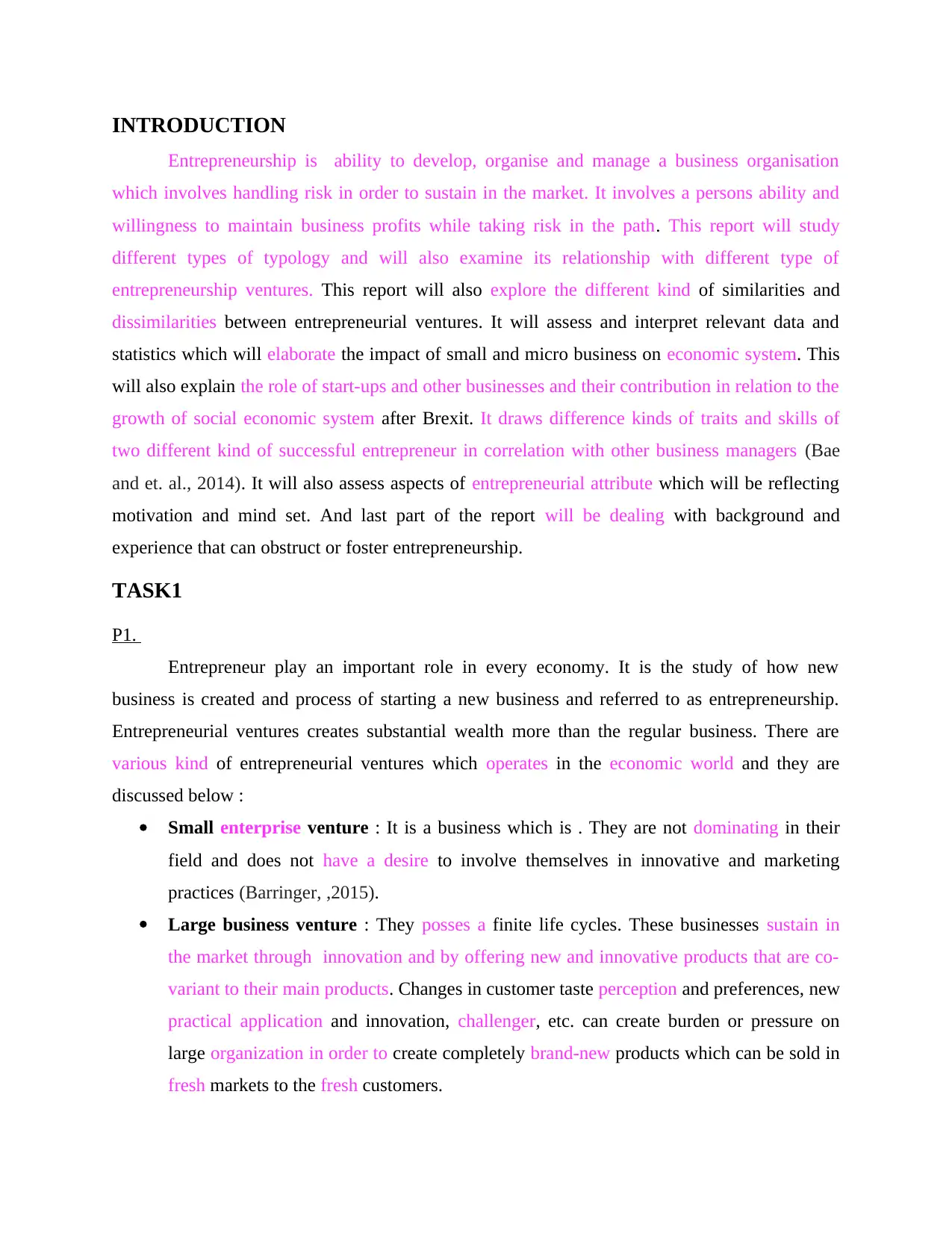
INTRODUCTION
Entrepreneurship is ability to develop, organise and manage a business organisation
which involves handling risk in order to sustain in the market. It involves a persons ability and
willingness to maintain business profits while taking risk in the path. This report will study
different types of typology and will also examine its relationship with different type of
entrepreneurship ventures. This report will also explore the different kind of similarities and
dissimilarities between entrepreneurial ventures. It will assess and interpret relevant data and
statistics which will elaborate the impact of small and micro business on economic system. This
will also explain the role of start-ups and other businesses and their contribution in relation to the
growth of social economic system after Brexit. It draws difference kinds of traits and skills of
two different kind of successful entrepreneur in correlation with other business managers (Bae
and et. al., 2014). It will also assess aspects of entrepreneurial attribute which will be reflecting
motivation and mind set. And last part of the report will be dealing with background and
experience that can obstruct or foster entrepreneurship.
TASK1
P1.
Entrepreneur play an important role in every economy. It is the study of how new
business is created and process of starting a new business and referred to as entrepreneurship.
Entrepreneurial ventures creates substantial wealth more than the regular business. There are
various kind of entrepreneurial ventures which operates in the economic world and they are
discussed below :
Small enterprise venture : It is a business which is . They are not dominating in their
field and does not have a desire to involve themselves in innovative and marketing
practices (Barringer, ,2015).
Large business venture : They posses a finite life cycles. These businesses sustain in
the market through innovation and by offering new and innovative products that are co-
variant to their main products. Changes in customer taste perception and preferences, new
practical application and innovation, challenger, etc. can create burden or pressure on
large organization in order to create completely brand-new products which can be sold in
fresh markets to the fresh customers.
Entrepreneurship is ability to develop, organise and manage a business organisation
which involves handling risk in order to sustain in the market. It involves a persons ability and
willingness to maintain business profits while taking risk in the path. This report will study
different types of typology and will also examine its relationship with different type of
entrepreneurship ventures. This report will also explore the different kind of similarities and
dissimilarities between entrepreneurial ventures. It will assess and interpret relevant data and
statistics which will elaborate the impact of small and micro business on economic system. This
will also explain the role of start-ups and other businesses and their contribution in relation to the
growth of social economic system after Brexit. It draws difference kinds of traits and skills of
two different kind of successful entrepreneur in correlation with other business managers (Bae
and et. al., 2014). It will also assess aspects of entrepreneurial attribute which will be reflecting
motivation and mind set. And last part of the report will be dealing with background and
experience that can obstruct or foster entrepreneurship.
TASK1
P1.
Entrepreneur play an important role in every economy. It is the study of how new
business is created and process of starting a new business and referred to as entrepreneurship.
Entrepreneurial ventures creates substantial wealth more than the regular business. There are
various kind of entrepreneurial ventures which operates in the economic world and they are
discussed below :
Small enterprise venture : It is a business which is . They are not dominating in their
field and does not have a desire to involve themselves in innovative and marketing
practices (Barringer, ,2015).
Large business venture : They posses a finite life cycles. These businesses sustain in
the market through innovation and by offering new and innovative products that are co-
variant to their main products. Changes in customer taste perception and preferences, new
practical application and innovation, challenger, etc. can create burden or pressure on
large organization in order to create completely brand-new products which can be sold in
fresh markets to the fresh customers.
⊘ This is a preview!⊘
Do you want full access?
Subscribe today to unlock all pages.

Trusted by 1+ million students worldwide
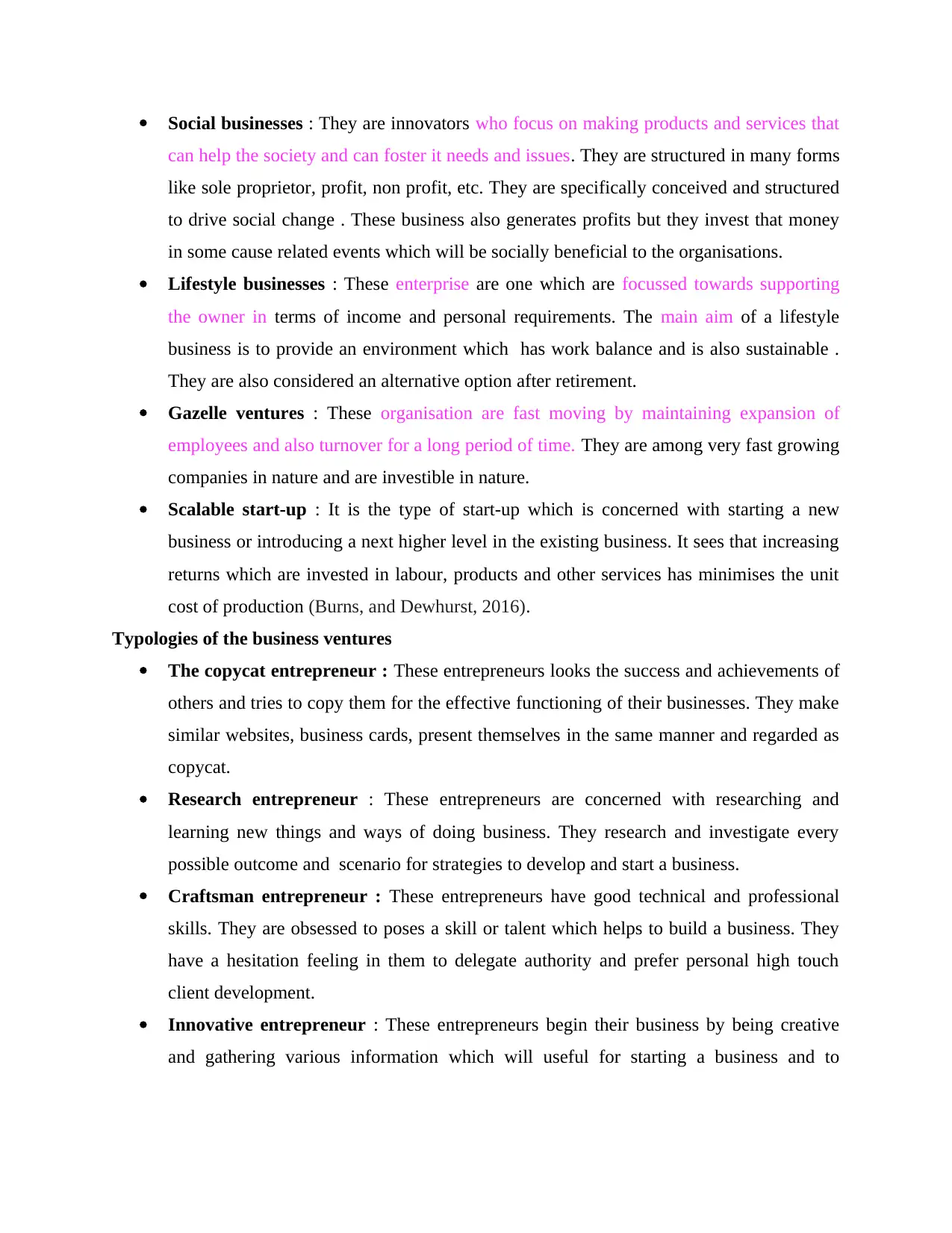
Social businesses : They are innovators who focus on making products and services that
can help the society and can foster it needs and issues. They are structured in many forms
like sole proprietor, profit, non profit, etc. They are specifically conceived and structured
to drive social change . These business also generates profits but they invest that money
in some cause related events which will be socially beneficial to the organisations.
Lifestyle businesses : These enterprise are one which are focussed towards supporting
the owner in terms of income and personal requirements. The main aim of a lifestyle
business is to provide an environment which has work balance and is also sustainable .
They are also considered an alternative option after retirement.
Gazelle ventures : These organisation are fast moving by maintaining expansion of
employees and also turnover for a long period of time. They are among very fast growing
companies in nature and are investible in nature.
Scalable start-up : It is the type of start-up which is concerned with starting a new
business or introducing a next higher level in the existing business. It sees that increasing
returns which are invested in labour, products and other services has minimises the unit
cost of production (Burns, and Dewhurst, 2016).
Typologies of the business ventures
The copycat entrepreneur : These entrepreneurs looks the success and achievements of
others and tries to copy them for the effective functioning of their businesses. They make
similar websites, business cards, present themselves in the same manner and regarded as
copycat.
Research entrepreneur : These entrepreneurs are concerned with researching and
learning new things and ways of doing business. They research and investigate every
possible outcome and scenario for strategies to develop and start a business.
Craftsman entrepreneur : These entrepreneurs have good technical and professional
skills. They are obsessed to poses a skill or talent which helps to build a business. They
have a hesitation feeling in them to delegate authority and prefer personal high touch
client development.
Innovative entrepreneur : These entrepreneurs begin their business by being creative
and gathering various information which will useful for starting a business and to
can help the society and can foster it needs and issues. They are structured in many forms
like sole proprietor, profit, non profit, etc. They are specifically conceived and structured
to drive social change . These business also generates profits but they invest that money
in some cause related events which will be socially beneficial to the organisations.
Lifestyle businesses : These enterprise are one which are focussed towards supporting
the owner in terms of income and personal requirements. The main aim of a lifestyle
business is to provide an environment which has work balance and is also sustainable .
They are also considered an alternative option after retirement.
Gazelle ventures : These organisation are fast moving by maintaining expansion of
employees and also turnover for a long period of time. They are among very fast growing
companies in nature and are investible in nature.
Scalable start-up : It is the type of start-up which is concerned with starting a new
business or introducing a next higher level in the existing business. It sees that increasing
returns which are invested in labour, products and other services has minimises the unit
cost of production (Burns, and Dewhurst, 2016).
Typologies of the business ventures
The copycat entrepreneur : These entrepreneurs looks the success and achievements of
others and tries to copy them for the effective functioning of their businesses. They make
similar websites, business cards, present themselves in the same manner and regarded as
copycat.
Research entrepreneur : These entrepreneurs are concerned with researching and
learning new things and ways of doing business. They research and investigate every
possible outcome and scenario for strategies to develop and start a business.
Craftsman entrepreneur : These entrepreneurs have good technical and professional
skills. They are obsessed to poses a skill or talent which helps to build a business. They
have a hesitation feeling in them to delegate authority and prefer personal high touch
client development.
Innovative entrepreneur : These entrepreneurs begin their business by being creative
and gathering various information which will useful for starting a business and to
Paraphrase This Document
Need a fresh take? Get an instant paraphrase of this document with our AI Paraphraser
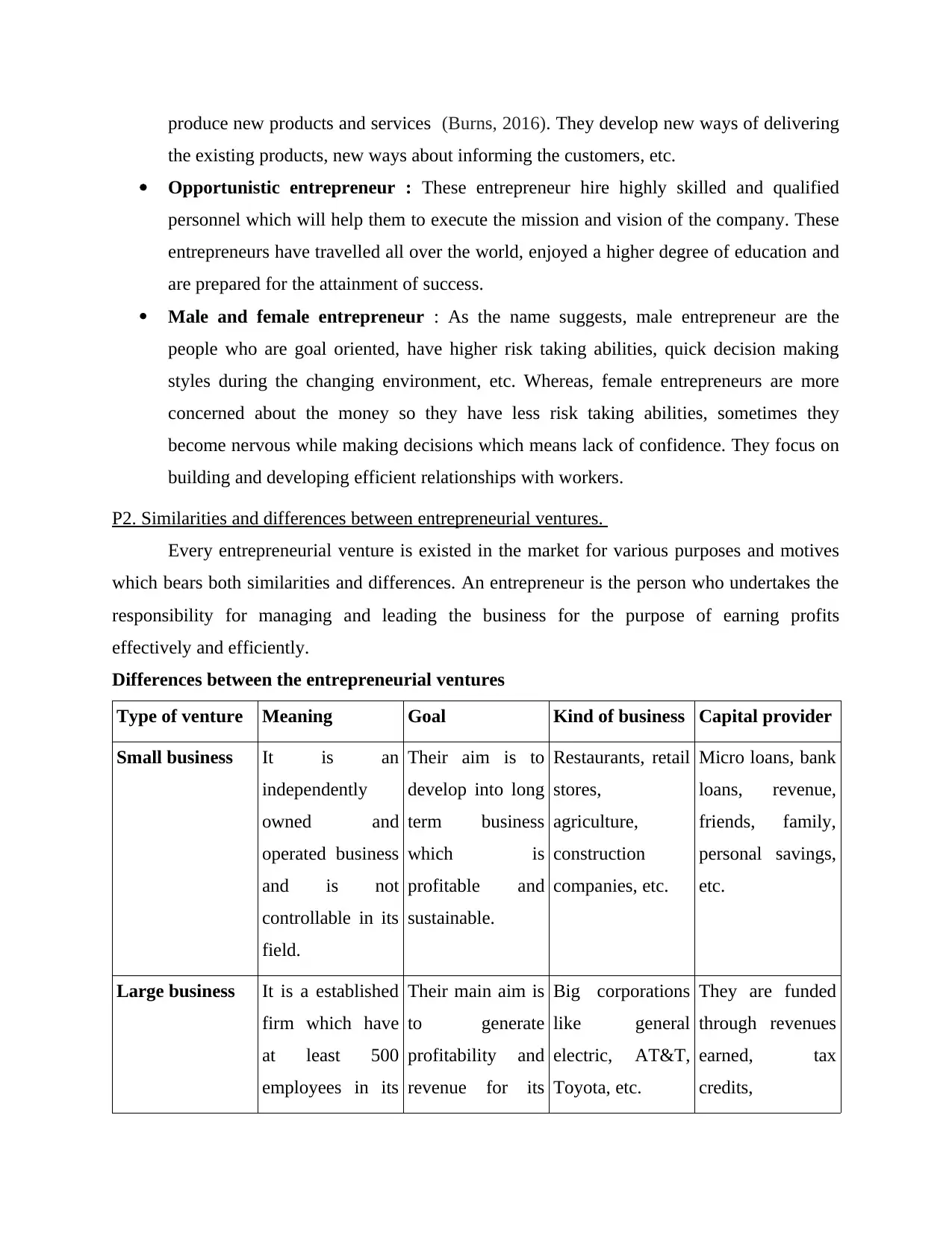
produce new products and services (Burns, 2016). They develop new ways of delivering
the existing products, new ways about informing the customers, etc.
Opportunistic entrepreneur : These entrepreneur hire highly skilled and qualified
personnel which will help them to execute the mission and vision of the company. These
entrepreneurs have travelled all over the world, enjoyed a higher degree of education and
are prepared for the attainment of success.
Male and female entrepreneur : As the name suggests, male entrepreneur are the
people who are goal oriented, have higher risk taking abilities, quick decision making
styles during the changing environment, etc. Whereas, female entrepreneurs are more
concerned about the money so they have less risk taking abilities, sometimes they
become nervous while making decisions which means lack of confidence. They focus on
building and developing efficient relationships with workers.
P2. Similarities and differences between entrepreneurial ventures.
Every entrepreneurial venture is existed in the market for various purposes and motives
which bears both similarities and differences. An entrepreneur is the person who undertakes the
responsibility for managing and leading the business for the purpose of earning profits
effectively and efficiently.
Differences between the entrepreneurial ventures
Type of venture Meaning Goal Kind of business Capital provider
Small business It is an
independently
owned and
operated business
and is not
controllable in its
field.
Their aim is to
develop into long
term business
which is
profitable and
sustainable.
Restaurants, retail
stores,
agriculture,
construction
companies, etc.
Micro loans, bank
loans, revenue,
friends, family,
personal savings,
etc.
Large business It is a established
firm which have
at least 500
employees in its
Their main aim is
to generate
profitability and
revenue for its
Big corporations
like general
electric, AT&T,
Toyota, etc.
They are funded
through revenues
earned, tax
credits,
the existing products, new ways about informing the customers, etc.
Opportunistic entrepreneur : These entrepreneur hire highly skilled and qualified
personnel which will help them to execute the mission and vision of the company. These
entrepreneurs have travelled all over the world, enjoyed a higher degree of education and
are prepared for the attainment of success.
Male and female entrepreneur : As the name suggests, male entrepreneur are the
people who are goal oriented, have higher risk taking abilities, quick decision making
styles during the changing environment, etc. Whereas, female entrepreneurs are more
concerned about the money so they have less risk taking abilities, sometimes they
become nervous while making decisions which means lack of confidence. They focus on
building and developing efficient relationships with workers.
P2. Similarities and differences between entrepreneurial ventures.
Every entrepreneurial venture is existed in the market for various purposes and motives
which bears both similarities and differences. An entrepreneur is the person who undertakes the
responsibility for managing and leading the business for the purpose of earning profits
effectively and efficiently.
Differences between the entrepreneurial ventures
Type of venture Meaning Goal Kind of business Capital provider
Small business It is an
independently
owned and
operated business
and is not
controllable in its
field.
Their aim is to
develop into long
term business
which is
profitable and
sustainable.
Restaurants, retail
stores,
agriculture,
construction
companies, etc.
Micro loans, bank
loans, revenue,
friends, family,
personal savings,
etc.
Large business It is a established
firm which have
at least 500
employees in its
Their main aim is
to generate
profitability and
revenue for its
Big corporations
like general
electric, AT&T,
Toyota, etc.
They are funded
through revenues
earned, tax
credits,
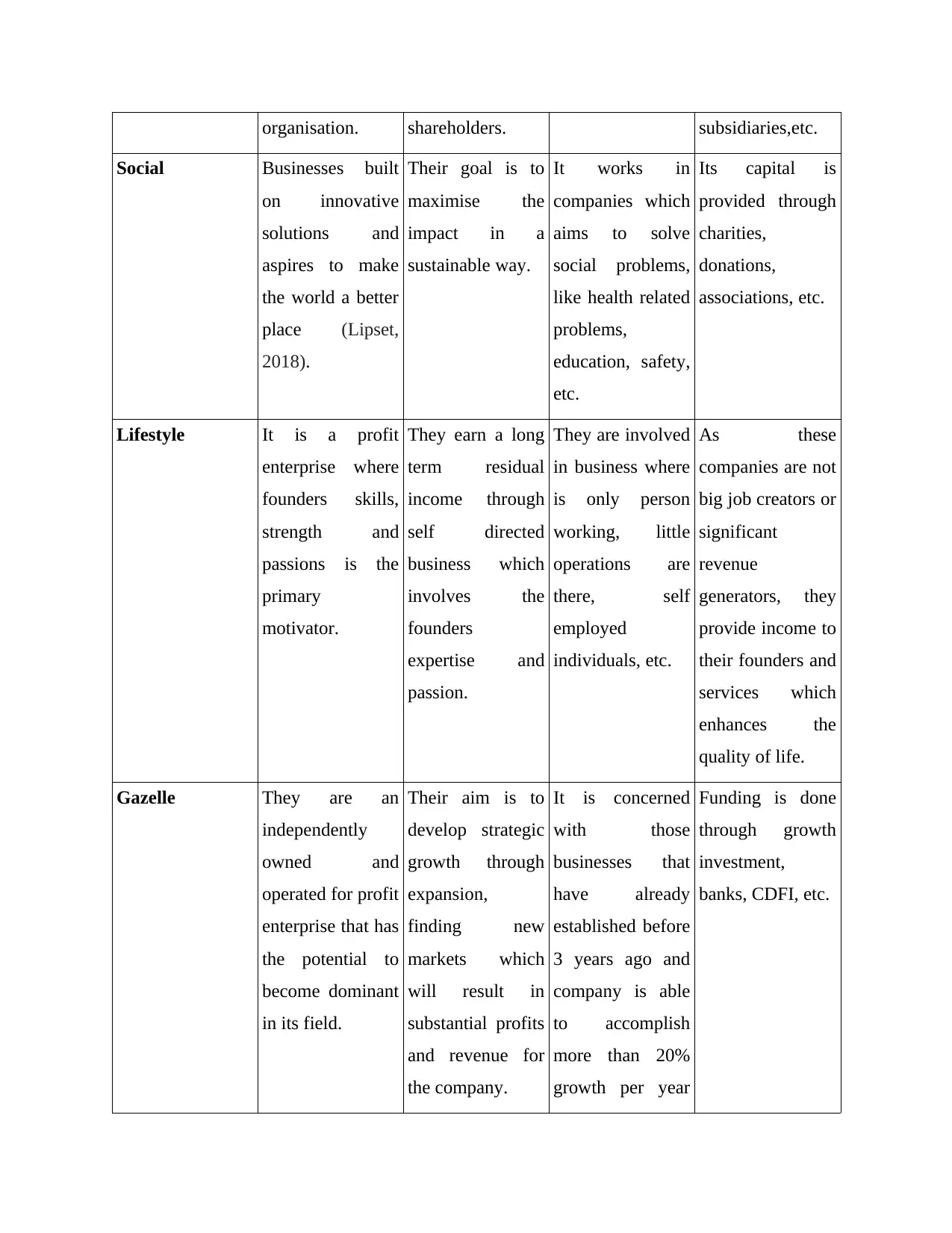
organisation. shareholders. subsidiaries,etc.
Social Businesses built
on innovative
solutions and
aspires to make
the world a better
place (Lipset,
2018).
Their goal is to
maximise the
impact in a
sustainable way.
It works in
companies which
aims to solve
social problems,
like health related
problems,
education, safety,
etc.
Its capital is
provided through
charities,
donations,
associations, etc.
Lifestyle It is a profit
enterprise where
founders skills,
strength and
passions is the
primary
motivator.
They earn a long
term residual
income through
self directed
business which
involves the
founders
expertise and
passion.
They are involved
in business where
is only person
working, little
operations are
there, self
employed
individuals, etc.
As these
companies are not
big job creators or
significant
revenue
generators, they
provide income to
their founders and
services which
enhances the
quality of life.
Gazelle They are an
independently
owned and
operated for profit
enterprise that has
the potential to
become dominant
in its field.
Their aim is to
develop strategic
growth through
expansion,
finding new
markets which
will result in
substantial profits
and revenue for
the company.
It is concerned
with those
businesses that
have already
established before
3 years ago and
company is able
to accomplish
more than 20%
growth per year
Funding is done
through growth
investment,
banks, CDFI, etc.
Social Businesses built
on innovative
solutions and
aspires to make
the world a better
place (Lipset,
2018).
Their goal is to
maximise the
impact in a
sustainable way.
It works in
companies which
aims to solve
social problems,
like health related
problems,
education, safety,
etc.
Its capital is
provided through
charities,
donations,
associations, etc.
Lifestyle It is a profit
enterprise where
founders skills,
strength and
passions is the
primary
motivator.
They earn a long
term residual
income through
self directed
business which
involves the
founders
expertise and
passion.
They are involved
in business where
is only person
working, little
operations are
there, self
employed
individuals, etc.
As these
companies are not
big job creators or
significant
revenue
generators, they
provide income to
their founders and
services which
enhances the
quality of life.
Gazelle They are an
independently
owned and
operated for profit
enterprise that has
the potential to
become dominant
in its field.
Their aim is to
develop strategic
growth through
expansion,
finding new
markets which
will result in
substantial profits
and revenue for
the company.
It is concerned
with those
businesses that
have already
established before
3 years ago and
company is able
to accomplish
more than 20%
growth per year
Funding is done
through growth
investment,
banks, CDFI, etc.
⊘ This is a preview!⊘
Do you want full access?
Subscribe today to unlock all pages.

Trusted by 1+ million students worldwide
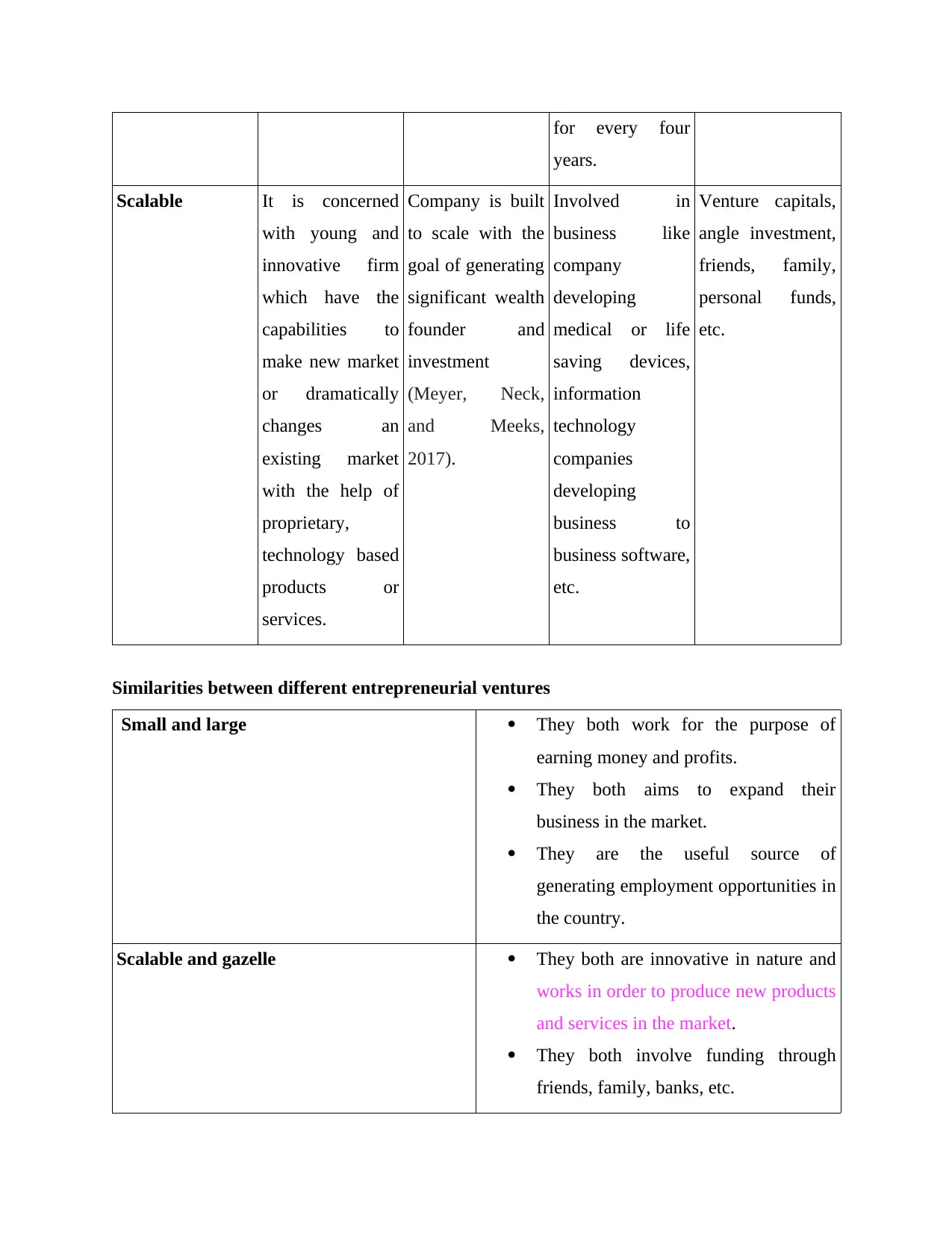
for every four
years.
Scalable It is concerned
with young and
innovative firm
which have the
capabilities to
make new market
or dramatically
changes an
existing market
with the help of
proprietary,
technology based
products or
services.
Company is built
to scale with the
goal of generating
significant wealth
founder and
investment
(Meyer, Neck,
and Meeks,
2017).
Involved in
business like
company
developing
medical or life
saving devices,
information
technology
companies
developing
business to
business software,
etc.
Venture capitals,
angle investment,
friends, family,
personal funds,
etc.
Similarities between different entrepreneurial ventures
Small and large They both work for the purpose of
earning money and profits.
They both aims to expand their
business in the market.
They are the useful source of
generating employment opportunities in
the country.
Scalable and gazelle They both are innovative in nature and
works in order to produce new products
and services in the market.
They both involve funding through
friends, family, banks, etc.
years.
Scalable It is concerned
with young and
innovative firm
which have the
capabilities to
make new market
or dramatically
changes an
existing market
with the help of
proprietary,
technology based
products or
services.
Company is built
to scale with the
goal of generating
significant wealth
founder and
investment
(Meyer, Neck,
and Meeks,
2017).
Involved in
business like
company
developing
medical or life
saving devices,
information
technology
companies
developing
business to
business software,
etc.
Venture capitals,
angle investment,
friends, family,
personal funds,
etc.
Similarities between different entrepreneurial ventures
Small and large They both work for the purpose of
earning money and profits.
They both aims to expand their
business in the market.
They are the useful source of
generating employment opportunities in
the country.
Scalable and gazelle They both are innovative in nature and
works in order to produce new products
and services in the market.
They both involve funding through
friends, family, banks, etc.
Paraphrase This Document
Need a fresh take? Get an instant paraphrase of this document with our AI Paraphraser
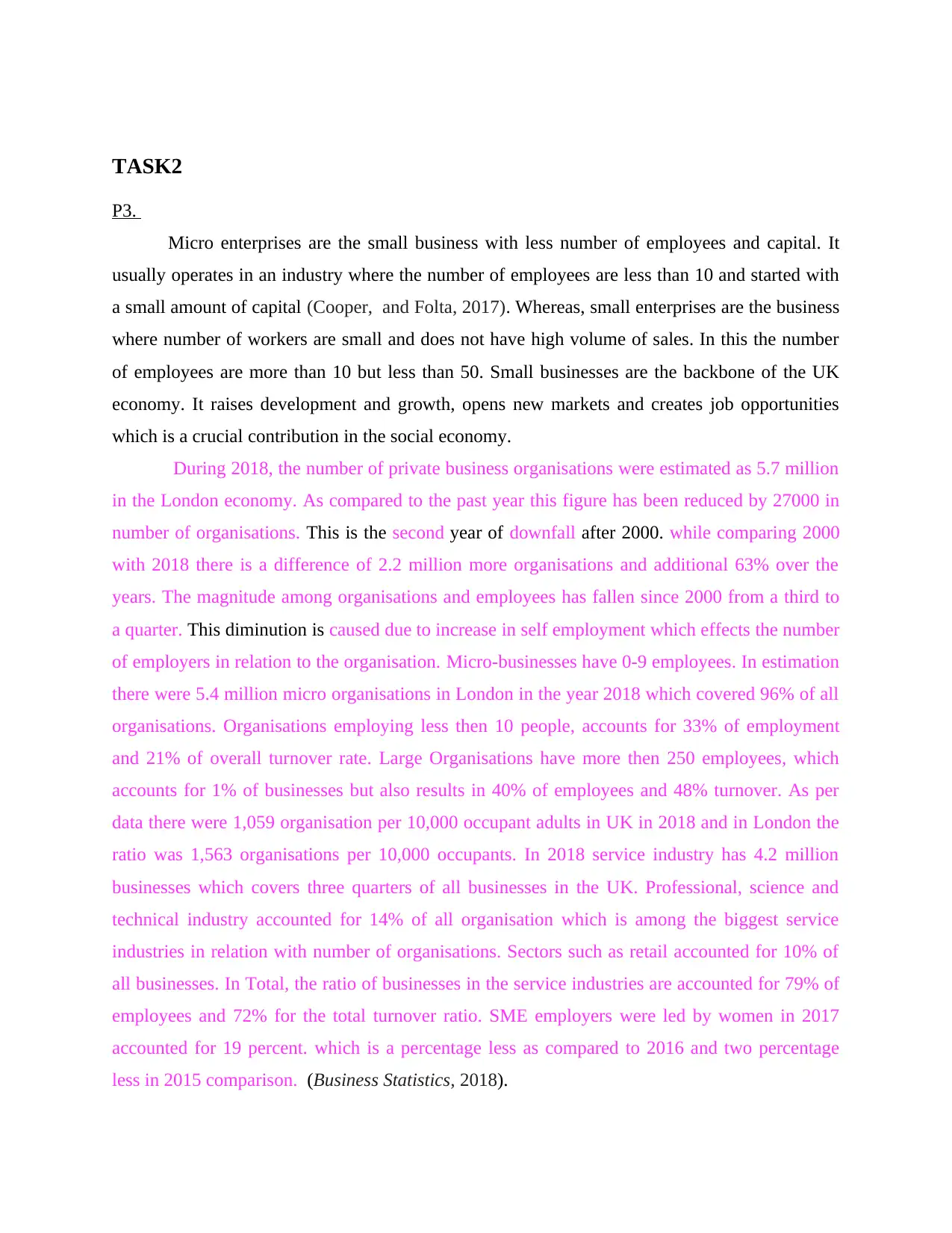
TASK2
P3.
Micro enterprises are the small business with less number of employees and capital. It
usually operates in an industry where the number of employees are less than 10 and started with
a small amount of capital (Cooper, and Folta, 2017). Whereas, small enterprises are the business
where number of workers are small and does not have high volume of sales. In this the number
of employees are more than 10 but less than 50. Small businesses are the backbone of the UK
economy. It raises development and growth, opens new markets and creates job opportunities
which is a crucial contribution in the social economy.
During 2018, the number of private business organisations were estimated as 5.7 million
in the London economy. As compared to the past year this figure has been reduced by 27000 in
number of organisations. This is the second year of downfall after 2000. while comparing 2000
with 2018 there is a difference of 2.2 million more organisations and additional 63% over the
years. The magnitude among organisations and employees has fallen since 2000 from a third to
a quarter. This diminution is caused due to increase in self employment which effects the number
of employers in relation to the organisation. Micro-businesses have 0-9 employees. In estimation
there were 5.4 million micro organisations in London in the year 2018 which covered 96% of all
organisations. Organisations employing less then 10 people, accounts for 33% of employment
and 21% of overall turnover rate. Large Organisations have more then 250 employees, which
accounts for 1% of businesses but also results in 40% of employees and 48% turnover. As per
data there were 1,059 organisation per 10,000 occupant adults in UK in 2018 and in London the
ratio was 1,563 organisations per 10,000 occupants. In 2018 service industry has 4.2 million
businesses which covers three quarters of all businesses in the UK. Professional, science and
technical industry accounted for 14% of all organisation which is among the biggest service
industries in relation with number of organisations. Sectors such as retail accounted for 10% of
all businesses. In Total, the ratio of businesses in the service industries are accounted for 79% of
employees and 72% for the total turnover ratio. SME employers were led by women in 2017
accounted for 19 percent. which is a percentage less as compared to 2016 and two percentage
less in 2015 comparison. (Business Statistics, 2018).
P3.
Micro enterprises are the small business with less number of employees and capital. It
usually operates in an industry where the number of employees are less than 10 and started with
a small amount of capital (Cooper, and Folta, 2017). Whereas, small enterprises are the business
where number of workers are small and does not have high volume of sales. In this the number
of employees are more than 10 but less than 50. Small businesses are the backbone of the UK
economy. It raises development and growth, opens new markets and creates job opportunities
which is a crucial contribution in the social economy.
During 2018, the number of private business organisations were estimated as 5.7 million
in the London economy. As compared to the past year this figure has been reduced by 27000 in
number of organisations. This is the second year of downfall after 2000. while comparing 2000
with 2018 there is a difference of 2.2 million more organisations and additional 63% over the
years. The magnitude among organisations and employees has fallen since 2000 from a third to
a quarter. This diminution is caused due to increase in self employment which effects the number
of employers in relation to the organisation. Micro-businesses have 0-9 employees. In estimation
there were 5.4 million micro organisations in London in the year 2018 which covered 96% of all
organisations. Organisations employing less then 10 people, accounts for 33% of employment
and 21% of overall turnover rate. Large Organisations have more then 250 employees, which
accounts for 1% of businesses but also results in 40% of employees and 48% turnover. As per
data there were 1,059 organisation per 10,000 occupant adults in UK in 2018 and in London the
ratio was 1,563 organisations per 10,000 occupants. In 2018 service industry has 4.2 million
businesses which covers three quarters of all businesses in the UK. Professional, science and
technical industry accounted for 14% of all organisation which is among the biggest service
industries in relation with number of organisations. Sectors such as retail accounted for 10% of
all businesses. In Total, the ratio of businesses in the service industries are accounted for 79% of
employees and 72% for the total turnover ratio. SME employers were led by women in 2017
accounted for 19 percent. which is a percentage less as compared to 2016 and two percentage
less in 2015 comparison. (Business Statistics, 2018).
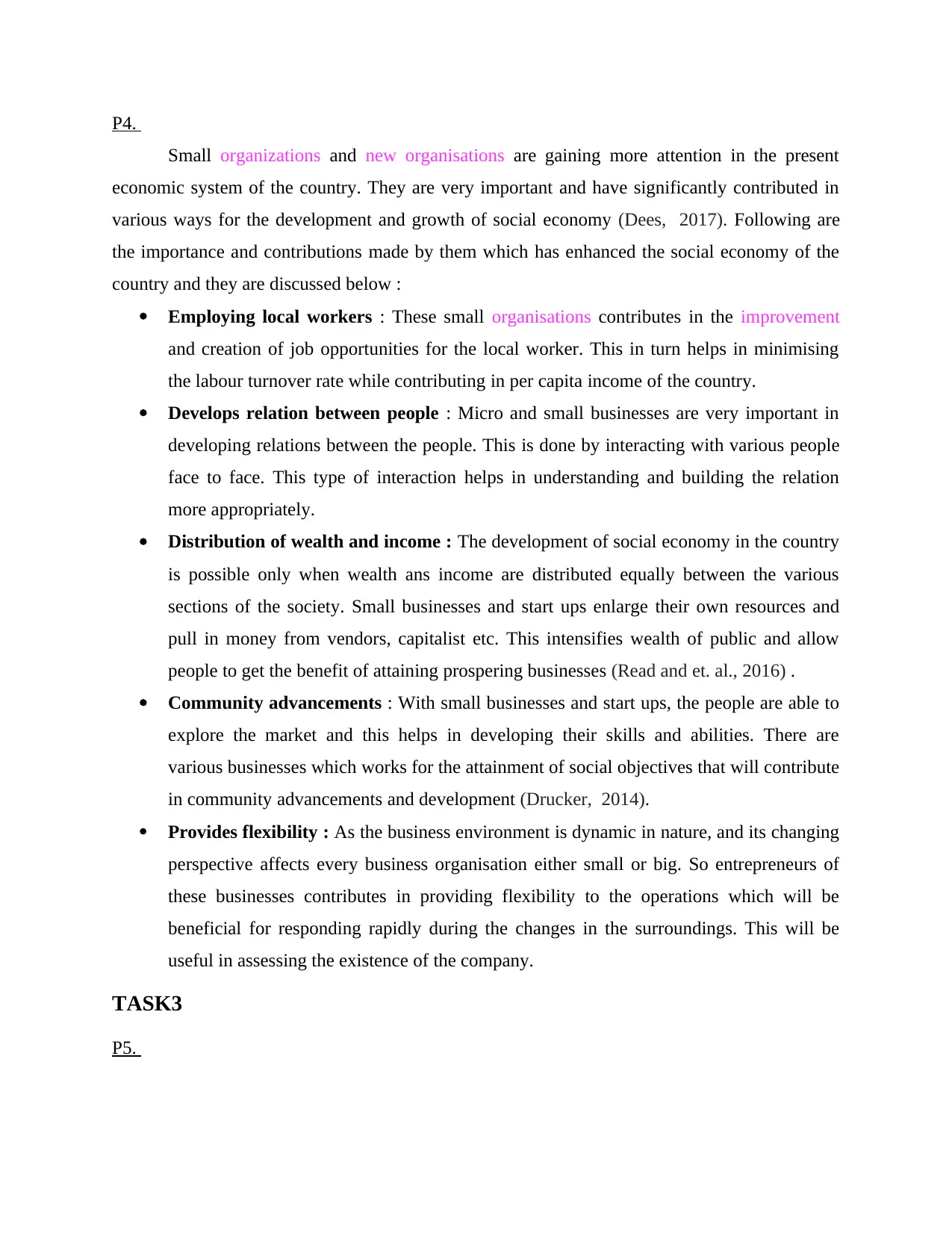
P4.
Small organizations and new organisations are gaining more attention in the present
economic system of the country. They are very important and have significantly contributed in
various ways for the development and growth of social economy (Dees, 2017). Following are
the importance and contributions made by them which has enhanced the social economy of the
country and they are discussed below :
Employing local workers : These small organisations contributes in the improvement
and creation of job opportunities for the local worker. This in turn helps in minimising
the labour turnover rate while contributing in per capita income of the country.
Develops relation between people : Micro and small businesses are very important in
developing relations between the people. This is done by interacting with various people
face to face. This type of interaction helps in understanding and building the relation
more appropriately.
Distribution of wealth and income : The development of social economy in the country
is possible only when wealth ans income are distributed equally between the various
sections of the society. Small businesses and start ups enlarge their own resources and
pull in money from vendors, capitalist etc. This intensifies wealth of public and allow
people to get the benefit of attaining prospering businesses (Read and et. al., 2016) .
Community advancements : With small businesses and start ups, the people are able to
explore the market and this helps in developing their skills and abilities. There are
various businesses which works for the attainment of social objectives that will contribute
in community advancements and development (Drucker, 2014).
Provides flexibility : As the business environment is dynamic in nature, and its changing
perspective affects every business organisation either small or big. So entrepreneurs of
these businesses contributes in providing flexibility to the operations which will be
beneficial for responding rapidly during the changes in the surroundings. This will be
useful in assessing the existence of the company.
TASK3
P5.
Small organizations and new organisations are gaining more attention in the present
economic system of the country. They are very important and have significantly contributed in
various ways for the development and growth of social economy (Dees, 2017). Following are
the importance and contributions made by them which has enhanced the social economy of the
country and they are discussed below :
Employing local workers : These small organisations contributes in the improvement
and creation of job opportunities for the local worker. This in turn helps in minimising
the labour turnover rate while contributing in per capita income of the country.
Develops relation between people : Micro and small businesses are very important in
developing relations between the people. This is done by interacting with various people
face to face. This type of interaction helps in understanding and building the relation
more appropriately.
Distribution of wealth and income : The development of social economy in the country
is possible only when wealth ans income are distributed equally between the various
sections of the society. Small businesses and start ups enlarge their own resources and
pull in money from vendors, capitalist etc. This intensifies wealth of public and allow
people to get the benefit of attaining prospering businesses (Read and et. al., 2016) .
Community advancements : With small businesses and start ups, the people are able to
explore the market and this helps in developing their skills and abilities. There are
various businesses which works for the attainment of social objectives that will contribute
in community advancements and development (Drucker, 2014).
Provides flexibility : As the business environment is dynamic in nature, and its changing
perspective affects every business organisation either small or big. So entrepreneurs of
these businesses contributes in providing flexibility to the operations which will be
beneficial for responding rapidly during the changes in the surroundings. This will be
useful in assessing the existence of the company.
TASK3
P5.
⊘ This is a preview!⊘
Do you want full access?
Subscribe today to unlock all pages.

Trusted by 1+ million students worldwide
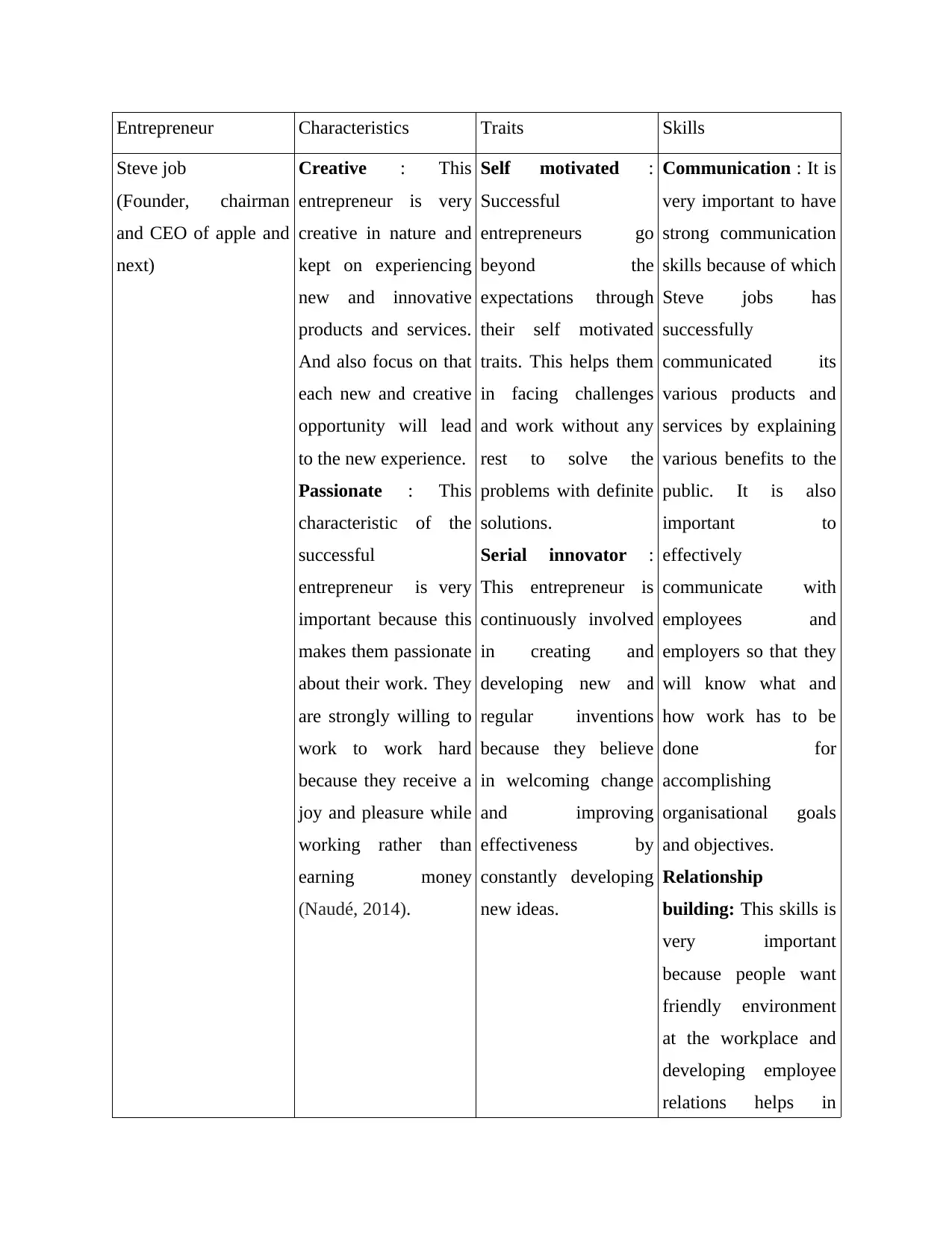
Entrepreneur Characteristics Traits Skills
Steve job
(Founder, chairman
and CEO of apple and
next)
Creative : This
entrepreneur is very
creative in nature and
kept on experiencing
new and innovative
products and services.
And also focus on that
each new and creative
opportunity will lead
to the new experience.
Passionate : This
characteristic of the
successful
entrepreneur is very
important because this
makes them passionate
about their work. They
are strongly willing to
work to work hard
because they receive a
joy and pleasure while
working rather than
earning money
(Naudé, 2014).
Self motivated :
Successful
entrepreneurs go
beyond the
expectations through
their self motivated
traits. This helps them
in facing challenges
and work without any
rest to solve the
problems with definite
solutions.
Serial innovator :
This entrepreneur is
continuously involved
in creating and
developing new and
regular inventions
because they believe
in welcoming change
and improving
effectiveness by
constantly developing
new ideas.
Communication : It is
very important to have
strong communication
skills because of which
Steve jobs has
successfully
communicated its
various products and
services by explaining
various benefits to the
public. It is also
important to
effectively
communicate with
employees and
employers so that they
will know what and
how work has to be
done for
accomplishing
organisational goals
and objectives.
Relationship
building: This skills is
very important
because people want
friendly environment
at the workplace and
developing employee
relations helps in
Steve job
(Founder, chairman
and CEO of apple and
next)
Creative : This
entrepreneur is very
creative in nature and
kept on experiencing
new and innovative
products and services.
And also focus on that
each new and creative
opportunity will lead
to the new experience.
Passionate : This
characteristic of the
successful
entrepreneur is very
important because this
makes them passionate
about their work. They
are strongly willing to
work to work hard
because they receive a
joy and pleasure while
working rather than
earning money
(Naudé, 2014).
Self motivated :
Successful
entrepreneurs go
beyond the
expectations through
their self motivated
traits. This helps them
in facing challenges
and work without any
rest to solve the
problems with definite
solutions.
Serial innovator :
This entrepreneur is
continuously involved
in creating and
developing new and
regular inventions
because they believe
in welcoming change
and improving
effectiveness by
constantly developing
new ideas.
Communication : It is
very important to have
strong communication
skills because of which
Steve jobs has
successfully
communicated its
various products and
services by explaining
various benefits to the
public. It is also
important to
effectively
communicate with
employees and
employers so that they
will know what and
how work has to be
done for
accomplishing
organisational goals
and objectives.
Relationship
building: This skills is
very important
because people want
friendly environment
at the workplace and
developing employee
relations helps in
Paraphrase This Document
Need a fresh take? Get an instant paraphrase of this document with our AI Paraphraser
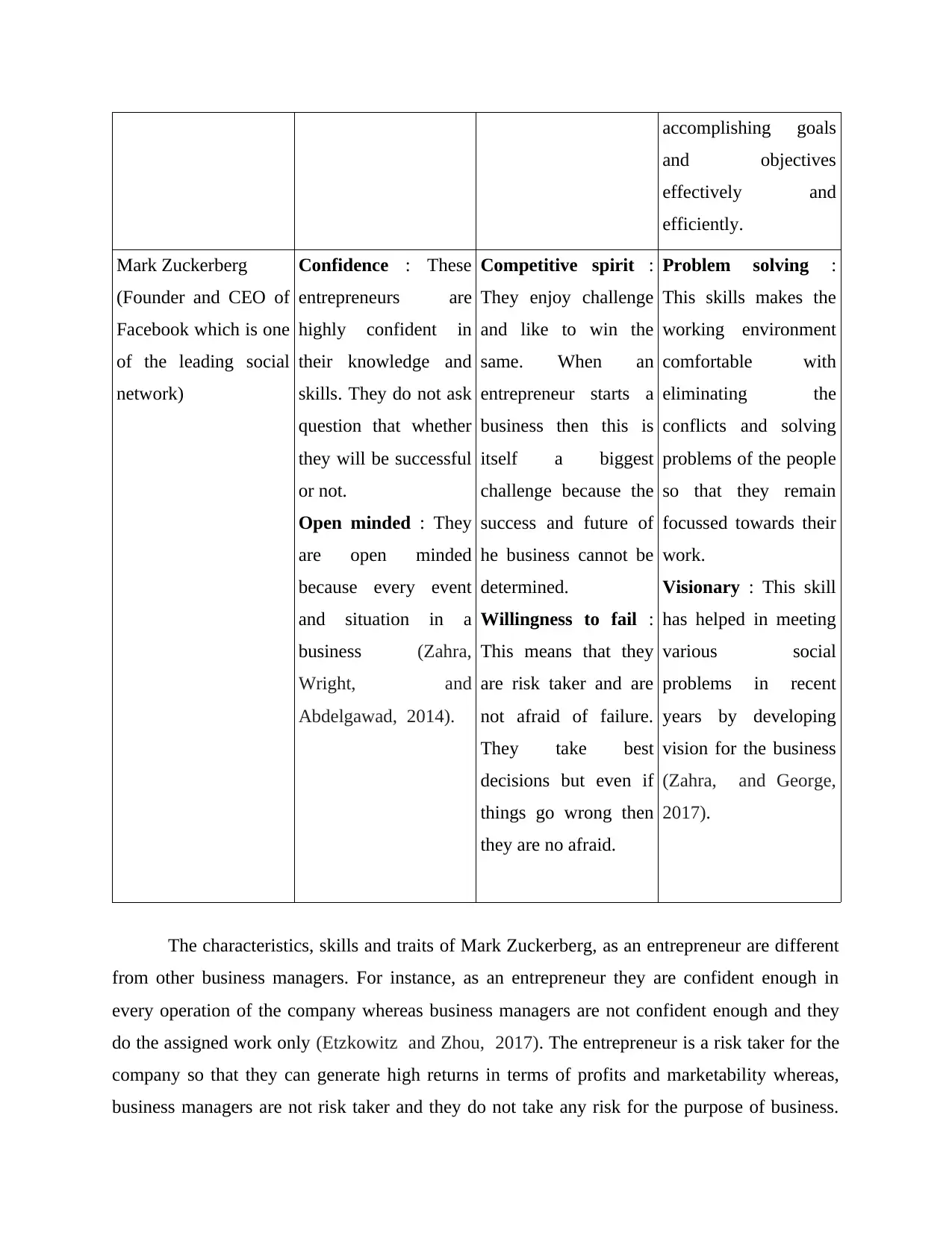
accomplishing goals
and objectives
effectively and
efficiently.
Mark Zuckerberg
(Founder and CEO of
Facebook which is one
of the leading social
network)
Confidence : These
entrepreneurs are
highly confident in
their knowledge and
skills. They do not ask
question that whether
they will be successful
or not.
Open minded : They
are open minded
because every event
and situation in a
business (Zahra,
Wright, and
Abdelgawad, 2014).
Competitive spirit :
They enjoy challenge
and like to win the
same. When an
entrepreneur starts a
business then this is
itself a biggest
challenge because the
success and future of
he business cannot be
determined.
Willingness to fail :
This means that they
are risk taker and are
not afraid of failure.
They take best
decisions but even if
things go wrong then
they are no afraid.
Problem solving :
This skills makes the
working environment
comfortable with
eliminating the
conflicts and solving
problems of the people
so that they remain
focussed towards their
work.
Visionary : This skill
has helped in meeting
various social
problems in recent
years by developing
vision for the business
(Zahra, and George,
2017).
The characteristics, skills and traits of Mark Zuckerberg, as an entrepreneur are different
from other business managers. For instance, as an entrepreneur they are confident enough in
every operation of the company whereas business managers are not confident enough and they
do the assigned work only (Etzkowitz and Zhou, 2017). The entrepreneur is a risk taker for the
company so that they can generate high returns in terms of profits and marketability whereas,
business managers are not risk taker and they do not take any risk for the purpose of business.
and objectives
effectively and
efficiently.
Mark Zuckerberg
(Founder and CEO of
Facebook which is one
of the leading social
network)
Confidence : These
entrepreneurs are
highly confident in
their knowledge and
skills. They do not ask
question that whether
they will be successful
or not.
Open minded : They
are open minded
because every event
and situation in a
business (Zahra,
Wright, and
Abdelgawad, 2014).
Competitive spirit :
They enjoy challenge
and like to win the
same. When an
entrepreneur starts a
business then this is
itself a biggest
challenge because the
success and future of
he business cannot be
determined.
Willingness to fail :
This means that they
are risk taker and are
not afraid of failure.
They take best
decisions but even if
things go wrong then
they are no afraid.
Problem solving :
This skills makes the
working environment
comfortable with
eliminating the
conflicts and solving
problems of the people
so that they remain
focussed towards their
work.
Visionary : This skill
has helped in meeting
various social
problems in recent
years by developing
vision for the business
(Zahra, and George,
2017).
The characteristics, skills and traits of Mark Zuckerberg, as an entrepreneur are different
from other business managers. For instance, as an entrepreneur they are confident enough in
every operation of the company whereas business managers are not confident enough and they
do the assigned work only (Etzkowitz and Zhou, 2017). The entrepreneur is a risk taker for the
company so that they can generate high returns in terms of profits and marketability whereas,
business managers are not risk taker and they do not take any risk for the purpose of business.
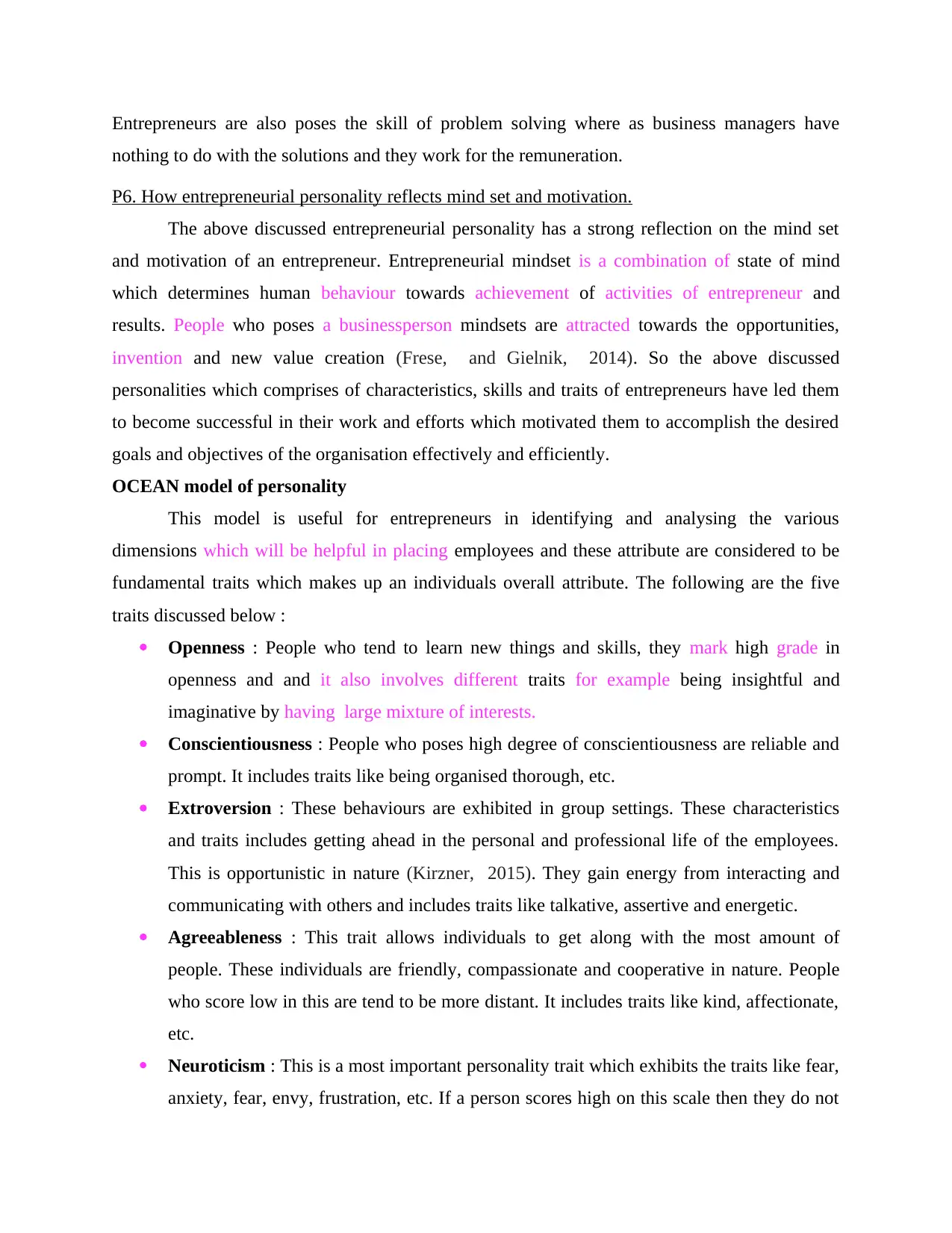
Entrepreneurs are also poses the skill of problem solving where as business managers have
nothing to do with the solutions and they work for the remuneration.
P6. How entrepreneurial personality reflects mind set and motivation.
The above discussed entrepreneurial personality has a strong reflection on the mind set
and motivation of an entrepreneur. Entrepreneurial mindset is a combination of state of mind
which determines human behaviour towards achievement of activities of entrepreneur and
results. People who poses a businessperson mindsets are attracted towards the opportunities,
invention and new value creation (Frese, and Gielnik, 2014). So the above discussed
personalities which comprises of characteristics, skills and traits of entrepreneurs have led them
to become successful in their work and efforts which motivated them to accomplish the desired
goals and objectives of the organisation effectively and efficiently.
OCEAN model of personality
This model is useful for entrepreneurs in identifying and analysing the various
dimensions which will be helpful in placing employees and these attribute are considered to be
fundamental traits which makes up an individuals overall attribute. The following are the five
traits discussed below :
Openness : People who tend to learn new things and skills, they mark high grade in
openness and and it also involves different traits for example being insightful and
imaginative by having large mixture of interests.
Conscientiousness : People who poses high degree of conscientiousness are reliable and
prompt. It includes traits like being organised thorough, etc.
Extroversion : These behaviours are exhibited in group settings. These characteristics
and traits includes getting ahead in the personal and professional life of the employees.
This is opportunistic in nature (Kirzner, 2015). They gain energy from interacting and
communicating with others and includes traits like talkative, assertive and energetic.
Agreeableness : This trait allows individuals to get along with the most amount of
people. These individuals are friendly, compassionate and cooperative in nature. People
who score low in this are tend to be more distant. It includes traits like kind, affectionate,
etc.
Neuroticism : This is a most important personality trait which exhibits the traits like fear,
anxiety, fear, envy, frustration, etc. If a person scores high on this scale then they do not
nothing to do with the solutions and they work for the remuneration.
P6. How entrepreneurial personality reflects mind set and motivation.
The above discussed entrepreneurial personality has a strong reflection on the mind set
and motivation of an entrepreneur. Entrepreneurial mindset is a combination of state of mind
which determines human behaviour towards achievement of activities of entrepreneur and
results. People who poses a businessperson mindsets are attracted towards the opportunities,
invention and new value creation (Frese, and Gielnik, 2014). So the above discussed
personalities which comprises of characteristics, skills and traits of entrepreneurs have led them
to become successful in their work and efforts which motivated them to accomplish the desired
goals and objectives of the organisation effectively and efficiently.
OCEAN model of personality
This model is useful for entrepreneurs in identifying and analysing the various
dimensions which will be helpful in placing employees and these attribute are considered to be
fundamental traits which makes up an individuals overall attribute. The following are the five
traits discussed below :
Openness : People who tend to learn new things and skills, they mark high grade in
openness and and it also involves different traits for example being insightful and
imaginative by having large mixture of interests.
Conscientiousness : People who poses high degree of conscientiousness are reliable and
prompt. It includes traits like being organised thorough, etc.
Extroversion : These behaviours are exhibited in group settings. These characteristics
and traits includes getting ahead in the personal and professional life of the employees.
This is opportunistic in nature (Kirzner, 2015). They gain energy from interacting and
communicating with others and includes traits like talkative, assertive and energetic.
Agreeableness : This trait allows individuals to get along with the most amount of
people. These individuals are friendly, compassionate and cooperative in nature. People
who score low in this are tend to be more distant. It includes traits like kind, affectionate,
etc.
Neuroticism : This is a most important personality trait which exhibits the traits like fear,
anxiety, fear, envy, frustration, etc. If a person scores high on this scale then they do not
⊘ This is a preview!⊘
Do you want full access?
Subscribe today to unlock all pages.

Trusted by 1+ million students worldwide
1 out of 15
Related Documents
Your All-in-One AI-Powered Toolkit for Academic Success.
+13062052269
info@desklib.com
Available 24*7 on WhatsApp / Email
![[object Object]](/_next/static/media/star-bottom.7253800d.svg)
Unlock your academic potential
Copyright © 2020–2025 A2Z Services. All Rights Reserved. Developed and managed by ZUCOL.





